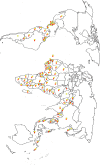Plasmodium and intestinal parasite perturbations of the infected host's inflammatory responses: a systematic review
- PMID: 29970128
- PMCID: PMC6031113
- DOI: 10.1186/s13071-018-2948-8
Plasmodium and intestinal parasite perturbations of the infected host's inflammatory responses: a systematic review
Abstract
Co-infection of malaria and intestinal parasites is widespread in sub-Saharan Africa and causes severe disease especially among the poorest populations. It has been shown that an intestinal parasite (helminth), mixed intestinal helminth or Plasmodium parasite infection in a human induces a wide range of cytokine responses, including anti-inflammatory, pro-inflammatory as well as regulatory cytokines. Although immunological interactions have been suggested to occur during a concurrent infection of helminths and Plasmodium parasites, different conclusions have been drawn on the influence this co-infection has on cytokine production. This review briefly discusses patterns of selected cytokine (IL-6, IL-8, IL-10, TNF-α and INF-γ) responses associated with infections caused by Plasmodium, intestinal parasites as well as a Plasmodium-helminth co-infection.
Conflict of interest statement
Ethics approval and consent to participate
Not applicable.
Consent for publication
Not applicable.
Competing interests
The authors declare that they have no competing interests.
Publisher’s Note
Springer Nature remains neutral with regard to jurisdictional claims in published maps and institutional affiliations.
Figures

References
-
- WHO . World Malaria Report. Geneva: WHO; 2017. World Malaria Report 2017.
-
- WHO . PCT databank. Edited by data GHOG. Geneva: WHO; 2017. Soil-transmitted helminthiases.
Publication types
MeSH terms
Substances
LinkOut - more resources
Full Text Sources
Other Literature Sources

